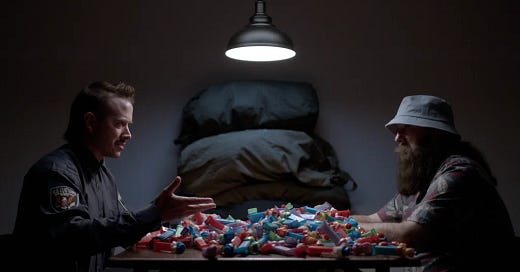Heartland: The Pez Outlaw
The Pez Outlaw is equally delightful, heartwarming, invigorating, and life-affirming.
Every year at Heartland Film Festival, I seek out a documentary that its title alone brings me so much joy and go into the movie knowing as little as possible. In 2019, that title belonged to “Bathtubs Over Broadway,” last year it was “Alien on Stage The Documentary,” and this year it belongs to “The Pez Outlaw,” which may just be the best film I’ve seen at Heartland, or so far this year.
The film follows Steve Glew, a native of Michigan with OCD, who has turned his life-long obsession with cereal boxes into something he could make a profit off of, sending in numerous cut-outs, to receive the mail-in prizes, that he’d eventually sell at a local toy show. When he hits a snag, all hope seems lost, that is until he learns about a Pez factory in Eastern Europe, where he strikes up an unlikely friendship that leads him to smuggling in Pez dispensers into the US.
What sets “The Pez Outlaw” apart from your typical documentary is filmmakers Amy Bandlien Storkel and Bryan Storkel’s complete and utter commitment into making this feel just as much as a ‘cinematic’ movie as it is a documentary. From portraying the glorious halls of the Pez factory as well as the telling a story that sounds so outrageous, but at its core is a very human story.
At times the documentary almost plays out like something from the head of Mike Judge or Christopher Guest, like when the film introduces the omnipresent villain The Pezident aka Scott McWhinnie, through a dorky photograph hung in a golden frame, or how Steve’s wife Kathy saying that the story of their love was “lust at first sight", before unapologetically claiming that their sex life is better than ever. “The Pez Outlaw” never looks down on its subjects, treating Steve Glew and his family, as well as his friends, with the utmost sincerity.
There’s the human side of it, but there is also some so engaging about “The Pez Outlaw,” it is without a doubt one of the funniest movies you’ll see all year, yet it is never laughing at Steve rather with him. Steve Glew is one of the most oddly charming and delightful “characters” to hit the screen this year. Not only does he provide an upbeat presence in his interviews, but he also gets to star as himself in stage recreations of his days smuggling Pez dispensers.
This also allows the filmmakers to get creative, for example, we learn Steve is an avid fan of Tom Clancy, and would read his books while working his old job, suddenly the film cuts to him sitting in a factory warehouse, where a SWAT team busts in and explosive action plays out all around him, he’s of course unfazed, with his head buried between the pages of his book.
There have been plenty of documentaries and docu-series that focused on eccentric subjects, shows like “Tiger King” come to mind. Though while many of those show some of the scummiest that humanity has to offer, “The Pez Outlaw” opts to show its subjects in a way that makes it very easy to fall in love with them. Even the European Pez collector, who won’t allow the documentarians to see his massive Pez collection, is portrayed in a way that is never sinister, but just goofy and filled with so much excitement and glee.
At its core “The Pez Outlaw” is a comedy. It really does feel like a film that would come from the head of a comedy auteur like a Judge or Guest, hell this feels like a concept of something that Will Ferrell would’ve done in the mid-2000s alongside “Talladega Nights” and “Blades of Glory,” but the fact this is real just makes all the better.
During a q&a after the film, co-director Bryan Storkely revealed that Steve hasn’t actually watched the film, not wanting to see his face on screen, and that instead would wait for the “real movie” behind his story. Storkely went on to say while Steve still hasn’t seen the film in full, he’s seen the trailer, and his friends and family have watched it, which made Glew realize, that this was the “real movie” all along. It’s the kind of story where Hollywood wouldn’t do it justice, and proof that fact is almost always better than fiction.





